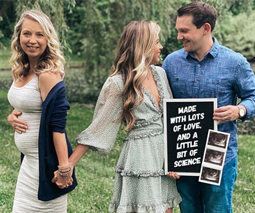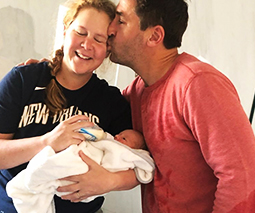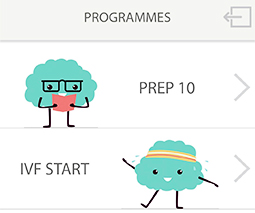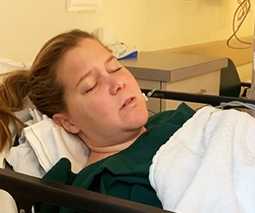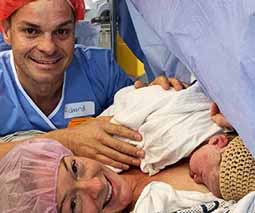A new business is giving grants to those struggling with the cost of IVF
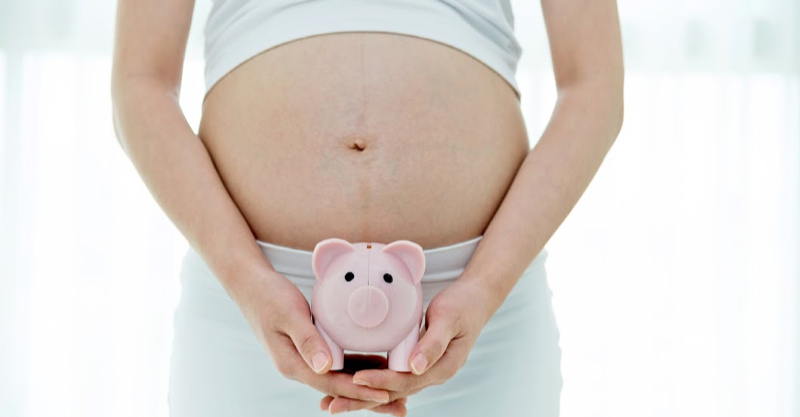
For some, trying to have a baby is an incredibly difficult journey. IVF is a modern wonder. However, it can be draining emotionally, physically and of course financially. Which is why one Sydney couple are now helping other families at least ease the financial burden with their new fertility fund, Minus One.
A costly experience
Phoebe Adams, from Sydney’s Northern Beaches, and her husband Toby have been trying for the last seven years to give their nine-year-old daughter Beatrix a sibling. They underwent two rounds of IVF unsuccessfully, which was a stretch for them financially (on top of the physical demands and emotions). So they started looking into alternative cost options for their third cycle but found there weren’t many.
“I knew that for any further rounds I wanted the best doctor and the best clinic, so a bulk billed clinic was not an option because you don’t have control over your choice of doctor and in some cases the timing that you can use the service. When you’re getting to a certain age or at that point in your treatment, you want results – whatever the cost,” says Phoebe.
But sometimes cost does become a restricting or problematic factor.
An idea forms
According to Phoebe, it was realising how stressful it was financially for her family, on top of the other grief and emotional turmoil, that made her think there just had to be another way.
“We are not even in what you would call financial stress. It made me feel for families less fortunate who may not even consider IVF as an option because of the cost, and they take on large debts in the hope of conceiving a child – with limited means to repay the debts,” she said. “I really felt that we needed to help Australian families in some small way, and if we can take the financial load off for some, then that’s a great place to start.”
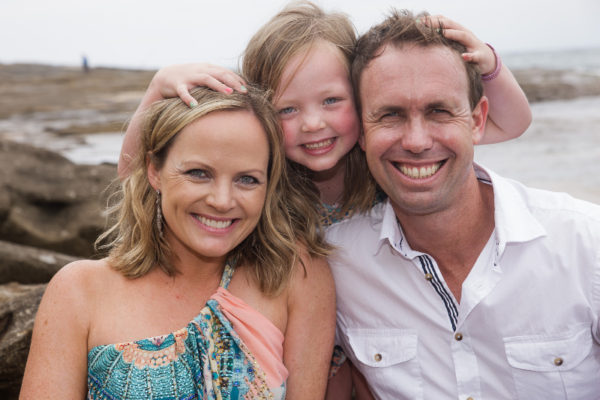
Phoebe, Beatrix and Toby
The Minus One concept
Phoebe and Toby have now established Minus One, a fertility funding business offering grants to couples and individuals from anywhere in Australia from the following categories:
- Financial hardship or low household income
- Number of unsuccessful cycles already undertaken
- General hardship and worthiness for a grant, e.g. illness, personal loss, family hardship and access to treatment
Applicants will also need to meet baseline criteria to be eligible, i.e. be classified as infertile (having tried to conceive naturally for one year unsuccessfully), and be deemed able to conceive via IVF by a fertility specialist (having undertaken basic testing).
Available from 2019, ten grants will be on offer for the first year with the aim to increase this as funding grows.
Read more about IVF stories:
- Bingo twins! Mum pays for daughter’s IVF with bingo winnings
- IVF swap shop – “Anybody want to trade my girl embryo for a boy?”
- Mum releases new emojis to help women open up about the pain of IVF
IVF cost snapshot
If you’re new to fertility treatment and unsure of how much it costs (without any financial assistance), here’s a rundown.
Firstly, the amount and type of treatments required by a couple or individual can vary quite a lot, so, unfortunately, it’s quite hard to predict precisely how much you’ll end up outlaying when you begin your IVF journey. For some, it might cost $10,000 if successful early on, while others could end up paying hundreds of thousands over the years.
Clinic fees in Australia also vary depending on where you go. There are a few bulk bill options available out there which help reduce costs. However, you don’t have control over who your doctor is or when you undergo treatments, which isn’t ideal for older women. Genea now offers interest-free delayed payment options via Zip, but the majority of IVF clinics do require all costs to be paid in full before any funds can be claimed back from Medicare or private health funds.
As a guide, IVF Australia charges the following for various individual treatments:
- Ovulation induction (to boost egg production) – $700 per cycle (not including medications and no rebate offered).
- Intrauterine Insemination (sperm is inserted into a woman by doctors) – $2,500 per round, with around $500 back from Medicare (a little more for subsequent tries in the same year).
- IVF cycle (egg extraction and fertilisation to create embryos) – $9,495 per round (not including day hospital fees which health cover can help with). You then receive an estimated $4,788 back from Medicare on your first round, and a bit more for extra cycles in the same year.
- ICIU cycle (specialised egg fertilisation when sperm count or quality is low) – $10,225 per round with an estimated $5,251 back from Medicare and a bit more for any subsequent rounds the same year. Health
- Frozen embryo transfer (fertilised egg inserted into a woman) – $3,650 each time, with around $1,391 back from Medicare, and a bit more with subsequent transfers the same year.
Additionally, other procedures that might be required and will incur extra costs include things like embryo, egg and sperm freezing; surgical sperm collection; donor sperm, eggs or embryos; genetic testing; fertility medications and embryo glue. Then on top of this, you might also need to factor in travel and accommodation (if you or donors don’t live near a clinic) and loss of income from time spent in appointments and recovering from treatments.
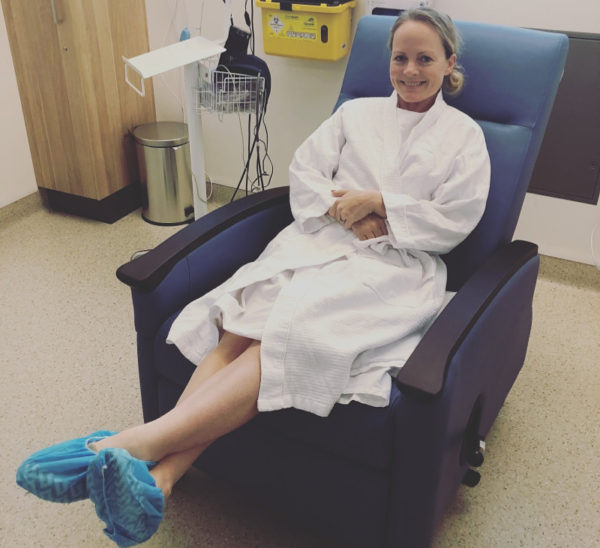
Phoebe undergoing IVF treatment
Emotional support
In addition to offering financial assistance to those facing costs such as the above, Minus One also aims to help in other ways.
“There is so much grief associated with infertility, and most families and individuals experience this alone because unfortunately there is still a stigma surrounding sharing what we are going through,” says Phoebe.
“Part of my goal with Minus One is to help reduce that stigma and enable people to connect and share their stories (outside of anonymous forums), to relieve and reduce some of the stress that the isolation can bring.”
Hope at last
Phoebe recently travelled to South Africa for her fourth round of IVF treatment using donor eggs and is excited to report on her website that she’s currently three months pregnant with twin girls.
It’s been a long bumpy road to get there, but through Minus One she’s hoping she can now make it easier for others to get their happy endings too.
“I want to bring a little bit of hope to Australians experiencing infertility and believe that by helping to bring some babies into this world that may not have otherwise been born, we can do just that.”
Minus One grant applications will officially open in 2019, however, you can register your details now via minusone.com.au. Interested financial sponsors can also contact Phoebe directly on phoebe@minusone.family.

